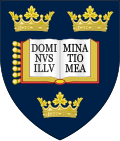References
- ↑ British History On-line
- ↑ Green, V.H.H. (1979). The Commonwealth of Lincoln College 1427-1977. Oxford: Oxford University Press. p. 46.
- ↑ "Archdeacons: Coventry". British History Online. Retrieved 30 September 2023.
- ↑ "Egerton MS 1070". British Library. Archived from the original on 5 December 2022. Retrieved 30 September 2023.
- ↑ "Fasti Ecclesiæ Anglicanæ: Or, An Essay Towards Deducing a Regular Succession of All the Principal Dignitaries" Le Neve, J p490: London; J.Nutt; 1716
| Academic offices | ||
|---|---|---|
| Preceded by | Rector of Lincoln College, Oxford 1480–1488 | Succeeded by |
| | This biographical article about an English academic administrator is a stub. You can help Wikipedia by adding missing information. |
| | This article relating to the University of Oxford is a stub. You can help Wikipedia by adding missing information. |
